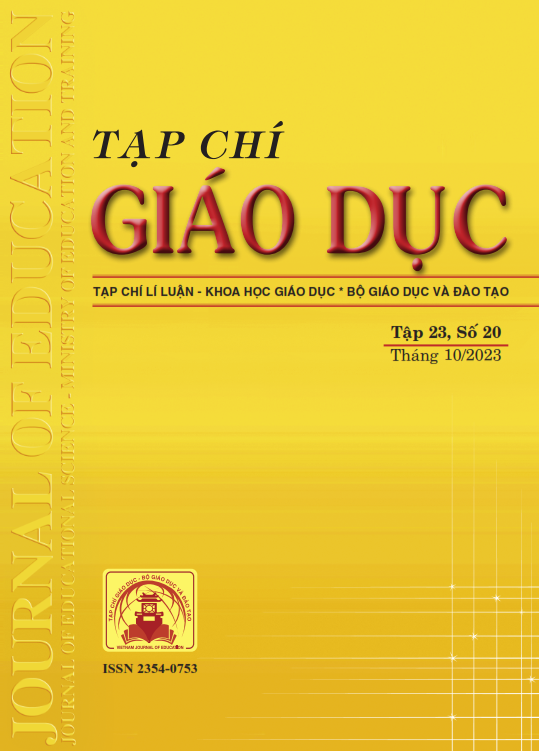Khảo sát học sinh về việc sử dụng phương pháp đóng vai trong dạy học môn Giáo dục công dân lớp 7
Tóm tắt
Using appropriate methods is essential in teaching to achieve the optimal learning outcomes. For the subject of Civic Education in lower secondary school, role-playing is an appropriate and effective teaching technique, helping students to actively and confidently participate in the lesson, memorize and apply knowledge in practice. The results of the survey on students' opinions of the relationship between the use of role-playing technique and the learning effectiveness of the Citizenship Education subject, Grade 7 at the School of Experimental Educational Sciences, Ba Dinh District, Hanoi underscore the positive impact of the very technique on learning psychology, creative thinking and students’ learning results. Using the role-play technique in Citizenship Education is essential to develop students' confidence, create interest, improve learning efficiency and knowledge application in practice.
Tài liệu tham khảo
Altun, M. (2015). Using role-play activities to develop speaking skills: A case study in the language classroom. International Journal of Social Sciences and Educational Studies, 1(4), 27-33.
Antonio-José, M-G., Carmen R-J., Gerardo G-G. & Magdalena, R. N-P. (2020) Educational Innovation in Higher Education: Use of Role Playing and Educational Video in Future Teachers’ Training. Sustainability, 12, 2558; https://doi.org/10.3390/su12062558
Arham, R., Yassi, A. H., & Arafah, B. (2016). The Use of Role Play to Improve Teaching Speaking. International Journal of Scientific and Research Publications, 6(3), 239-241.
Bộ GD-ĐT (2018). Chương trình giáo dục phổ thông môn Giáo dục công dân (ban hành kèm theo Thông tư số 32/2018/TT-BGDĐT ngày 26/12/2018 của Bộ trưởng Bộ GD-ĐT).
Bullough, Jr. R. V., & Stokes, D. K. (1994). Analyzing personal teaching metaphors in preservice teacher education as a means for encouraging professional development. American Educational Research Journal, 31(1), 197-224.
Choy, S. & Cheah, P. (2009). Teacher perceptions of critical thinking among students and its influence on higher education. International Journal of Teaching and Learning in Higher Education, 20, 198-206.
Coanda, I., & Aupers, S. (2020) Mechanisms of Disclosure: A Socio-technical Perspective on Sociality in Massively Multiplayer Online Role-playing Games. Telev. New Media, 21, 315-333.
Darling-Hammond, L. (2016). Research on teaching and teacher education and its influences on policy and practice. Educational Researcher, 45(2), 83-91.
Fadilah, F. (2016). Teaching speaking by role-play activity. OKARA: Jurnal Bahasa dan Sastra, 10(2), 209-216.
Fernandez-Batanero, J. M., Cabero, J., & López, E. (2019). Knowledge and degree of training of primary education teachers in relation to ICT taught to students with disabilities. British Journal of Educational Technology, 50, 1-18.
Gass, S., & Mackey, A (2006). Input, Interaction and Output: an Overview. AILA Review, 19, 3-17.
Hoàng Phê (chủ biên, 1992). Từ điển tiếng Việt. NXB Đà Nẵng.
Krisnayanti, P. D., Sudiana, N., & Marhaeni, A. (2013). Pengaruh implementasi metode pembelajaran bermain peran terhadap kemampuan berbicara dan kreativitas peserta didik dalam pembelajaran bahasa indonesia. eJournal Program Pascasarjana Universitas Pendidikan Ganesha Jurusan Pendidikan Dasar, 3(1), 1-9.
Kuśnierek, A. (2015). Developing students’ speaking skills through role-play. World Scientific News, 7, 73-111.
Nguyễn Văn Cư, Nguyễn Duy Nhiên (đồng chủ biên, 2008). Dạy và học môn Giáo dục công dân ở trường trung học phổ thông - những vấn đề lí luận và thực tiễn. NXB Đại học Sư phạm.
Phạm Việt Thắng (2017). Vận dụng phương pháp đóng vai trong dạy học môn giáo dục công dân ở trường trung học phổ thông hiện nay. Tạp chí Khoa học, Trường Đại học Sư phạm Hà Nội, 62(9), 213-222.
Phan Thị Thanh Hội (2017). Vận dụng phương pháp đóng vai dạy học tích hợp bảo tồn thiên nhiên và đa dạng sinh học môn Sinh học cấp trung học cơ sở. Tạp chí Giáo dục, 404, 50-53.
Rayner, S. (2007). A teaching elixir, learning chimera or just fool's gold? Do learning stylesmatter?. Support for Learning, 22(1), 24-30.
Tian, X., & Martin, B. (2014). Curriculum design, development and implementation in a transnational higher education context. Journal of Applied Research in Higher Education, 6(2), 190-204.
Waters, J., & Leung, M. (2013). A colourful university life? Transnational higher education and the spatial dimensions of institutional social capital in Hong Kong. Population, Space and Place, 19(2), 155-167.
Yorke, M. (2003). Formative assessment in higher education: Moves towards theory and the enhancement of pedagogic practice. Higher Education, 45(4), 477-501.
Tải xuống
Đã Xuất bản
Cách trích dẫn
Số
Chuyên mục
Giấy phép

Tác phẩm này được cấp phép theo Ghi nhận tác giả của Creative Commons Giấy phép quốc tế 4.0 .












